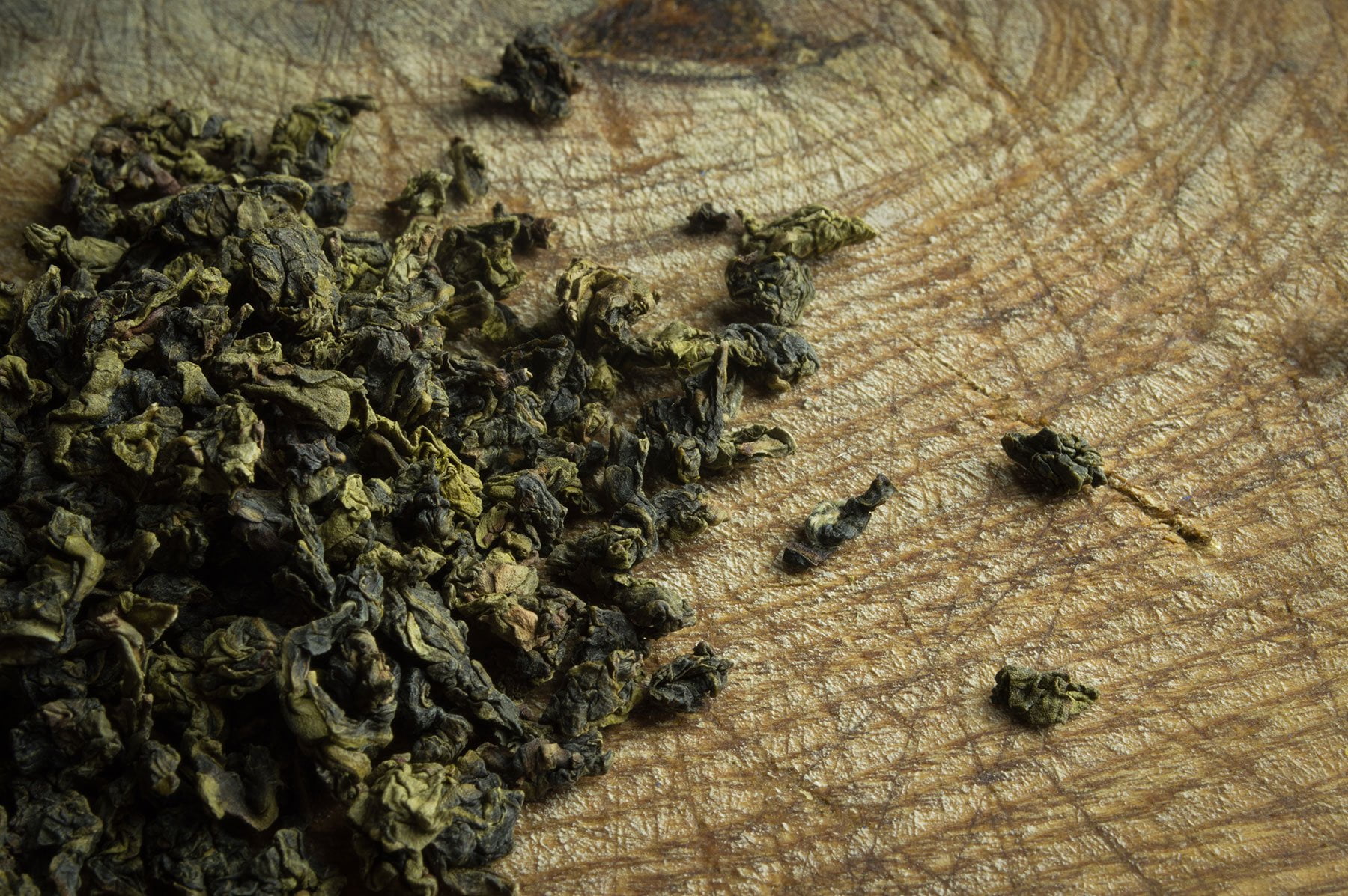
Table of Contents
What Is Oolong Tea?
Oolong tea is a traditional Chinese tea made from the same plant as green and black tea — Camellia sinensis. What sets oolong apart is that it’s partially fermented, placing it between green or black tea in both flavour and oxidation. Depending on the processing, oolong tea can be oxidised anywhere between 8–80%, resulting in a wide variety of taste profiles and health benefits.
Known for its complex production and artisan appeal, oolong tea is cultivated mainly in China and Taiwan. From floral spring infusions to deeper, roasted varieties, oolong tea offers a sensory experience unlike any other tea category.
Why Oolong Tea Is Unique
Oolong tea leaves are either rolled or twisted, and the final flavour is shaped by altitude, soil, harvest time, and method of oxidation. As a partially fermented tea, oolong contains a diverse profile of compounds including tea catechins, theaflavins, and tea polysaccharides — all of which contribute to its beneficial effects on human health.
Whether you prefer fresh tea leaves brewed in a traditional teapot or convenient tea bags, oolong tea consumption has been associated with improved overall health, making it an ideal addition to your daily tea intake.
Top 15 Health Benefits of Oolong Tea
1. Packed with Antioxidants
Oolong tea extract delivers a potent blend of antioxidants, combining catechins found in green tea with theaflavins typical of black tea. Some research suggests that certain oolong tea varieties may even surpass green tea in antioxidative activity, contributing to better cellular protection and reduced oxidative stress.
2. Supports Weight Loss
Habitual tea consumption, particularly oolong, may assist in fat oxidation and help decrease body fat. Animal studies show that oolong tea extract can reduce body weight and abdominal fat, even when consumed alongside a high-fat diet. The caffeine content and active polyphenols in oolong are believed to enhance energy expenditure and improve metabolism.
3. May Lower Risk of Type 2 Diabetes
Oolong tea drinkers have shown improved blood sugar management in clinical studies. One study from Japan found that drinking oolong tea daily reduced glucose levels in participants by up to 30%, suggesting a role in reducing diabetes risk through better insulin sensitivity.
4. Strengthens the Immune System
Drinking tea regularly — particularly oolong — can support immune function. Rich in flavonoids and antioxidants, oolong tea helps promote antibacterial protein production and can guard against cellular damage. This is especially useful during cold and flu season.
5. Reduces Risk of Stroke
Regular tea consumption has been linked to a lower stroke risk. A study on tea intake showed that people who drank oolong tea daily had a 21% reduced risk of experiencing a stroke, supporting brain health and cardiovascular resilience.
6. Promotes Heart Health
Oolong tea is beneficial for those seeking to reduce the risk of heart disease. Its polyphenols can improve blood circulation, reduce LDL cholesterol, and assist with managing high blood pressure — three key risk factors in cardiovascular disease.
7. May Help with Eczema and Skin Health
Thanks to its antioxidant and anti-inflammatory properties, oolong tea may alleviate skin conditions such as eczema. The tea’s ability to fight free radicals and reduce inflammation supports clearer, more resilient skin.
8. Improves Sleep Quality
Despite being a caffeinated beverage, oolong tea contains L-theanine, which can aid relaxation and reduce stress levels. The combination of L-theanine and GABA contributes to mental calm and better sleep patterns, especially when oolong tea is consumed earlier in the day.
9. Strengthens Teeth and Bone Density
Rich in fluoride, calcium, and magnesium, oolong tea helps prevent tooth decay and supports strong bones. Tea drinkers who consume oolong tea daily may have greater bone mineral density and a reduced risk of osteoporosis compared to non-tea drinkers.
10. Boosts Energy Naturally
Oolong contains enough caffeine to improve mental alertness without causing the jitters associated with too much caffeine. The synergistic effect of caffeine and L-theanine helps you stay focused while also enhancing mood and energy levels.
11. May Assist in Cancer Prevention
Antioxidants in oolong tea, particularly polyphenols and EGCG, have shown promising effects in reducing cancer risk. Research suggests oolong tea may help inhibit the development of certain cancers such as oral squamous cell carcinoma, ovarian, and throat cancers. While more clinical trials are needed, the existing findings are encouraging.
12. Encourages Gut Health
Oolong tea supports liver health and digestive balance by nurturing beneficial gut bacteria. Studies in nutrition science have shown that oolong tea infusion contributes to a more positive gut environment, which in turn helps reduce digestive issues and improve immunity.
13. Supports Brain Function
Oolong tea could help slow cognitive decline and reduce the risk of neurodegenerative diseases. Polyphenols and caffeine together protect the brain, while the presence of L-theanine enhances memory and focus. Regular tea consumption may also lower the risk of Alzheimer’s and Parkinson’s.
14. Lifts Mood and Reduces Stress
The calming amino acid L-theanine found in oolong can reduce stress without sedating you. Combined with a moderate caffeine intake, oolong tea helps balance mood and reduce anxiety — making it an excellent pick-me-up for your afternoon break.
15. May Reduce Risk of Parkinson’s Disease
One of the lesser-known benefits of oolong tea is its ability to support neurotransmitter activity. This may help reduce the risk of Parkinson’s Disease through improved brain signalling, reduced inflammation, and better cognitive function.
How to Brew Oolong Tea
Brewing oolong tea is simple and satisfying. Here’s how to make the perfect oolong tea infusion:
- Use 2 tablespoons of loose leaf tea per 180ml (6oz) of water
- Heat water to around 85–90°C
- Steep the tea for 1–5 minutes, depending on how strong you like it
- Strain and serve plain or with a slice of lemon (avoid milk)
Oolong tea can be served hot or iced. Popular pairings include citrus fruits and light floral additions like peach or jasmine.
Possible Side Effects of Oolong Tea
Oolong tea is generally safe for most people, but like all caffeinated beverages, excessive intake may cause:
- Upset stomach
- Headaches
- Insomnia
- Heartburn
- Jitters
- Constipation
It may also reduce iron absorption in some people. If you’re sensitive to caffeine or take certain medications, consider consulting your doctor before increasing your tea intake.
Final Thoughts
Oolong tea is a unique and versatile beverage with a long history in traditional Chinese tea culture. With its partial fermentation, wide flavour range, and extensive list of health-promoting properties, it’s no wonder oolong is gaining recognition in modern nutrition science.
Whether you’re looking to support brain health, improve liver function, manage body weight, or simply enjoy a soothing, flavourful cup — oolong tea could be a powerful addition to your daily wellness routine.




